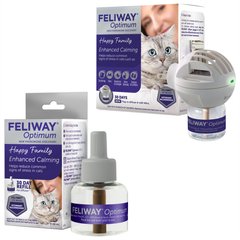Why Do Cats Lick Themselves?
Adobe Stock/sonyachny
Cats spend about two to five hours of their day licking their fur. This might seem like a lot of time, but it’s a perfectly normal behavior that serves many purposes, from cleaning themselves to alleviating itchiness to relieving stress. Cats may also lick other animals—even humans—as a way to bond.
However, if cats start licking their fur more often than usual or if grooming begins to disrupt their normal activities like sleeping, it can signal a medical or behavioral issue that should be addressed by a veterinarian.
Key Takeaways
- Every day, cats spend two to five hours licking their fur.
- Cats lick themselves for many different reasons, from grooming to self-soothing.
- Cats also lick other cats and humans to communicate and show affection.
Why Do Cats Lick Themselves?
To fully understand grooming in cats, it’s important to know that licking their fur is a completely normal behavior that they need to do every day. In fact, kittens start to groom themselves at just 4 weeks old.
Grooming is an important part of cat behavior, and cats lick themselves for a few different reasons.
-
Cleaning the coat: One key purpose of fur licking in cats is to clean the coat, removing dirt, loose fur, and skin parasites, for which a cat’s rough tongue is perfectly suited. Cats will also lick their paws and use them to wipe their ears and face after eating a meal, which cleans the fur and spreads oils evenly over the face from special oil glands located on the top of the head and chin.
-
Regulating body temperature: Licking helps regulate body temperature, as saliva evaporates from the surface of a cat’s body and takes excess body heat along with it.
-
Improving circulation: The massaging action of the tongue against the skin also improves blood circulation, especially through a cat’s legs and toes.
-
Itchy skin: Cats will sometimes focus on areas of itchy skin when they lick themselves. If you notice your cat licking one area more than others, they could have irritated skin in that spot.
-
Pain: Cats also focus on areas of skin over body parts that are causing them discomfort, such as painful joints in cats with arthritis, or the lower belly in cats with urinary tract infections or bladder stones.
-
Stress and anxiety: Cats can react to life changes such as moving, construction, new family members, and new routines by grooming themselves more, which helps soothe feelings of stress and anxiety by releasing endorphins (mood-boosting hormones) into the bloodstream. Taking steps to calm your cat, like using a pheromone diffuser, might help prevent anxious grooming.
Why Do Cats Lick Each Other?
When cats lick other cats, it’s usually a form of social grooming behavior.
Cats have scent glands on the top of their head and along their cheeks. When cats lick each other’s faces, they are exposed to (and combining!) each other’s scents. Combining their own scents into a new smell helps social groups develop a shared “colony scent” that identifies each other as members of a family unit.
Licking also helps cats bond and express affection for each other. It also helps cats remove parasites and dirt from each other’s coats, especially in hard-to-reach areas. This helps both remain healthy and survive longer—it’s a behavior passed down from their wild ancestors.
Mother cats will also lick their newborn kittens to clean them and help them maintain their coat when they are too young to do so for themselves. In turn, young kittens will begin to groom littermates and their mother early in life.
Licking their fur is a completely normal behavior that cats need to do every day.
Why Does My Cat Lick Me?
When your cat licks you, there may be a few reasons behind the behavior.
Cats tend to treat their human companions as if they were also cats, so your cat might lick you for many of the same reasons they would lick another cat, such as to express affection and to exchange scents with you so that you and your cat also form your own colony scent.
Your cat may also lick you to help “groom” you, as they would with another adult cat, or to get your attention. Your cat may also just like the taste of your skin, as the sweat and oils from your pores may be enticing for them.
When To Go to the Vet
While licking is a completely normal behavior for cats, it can become excessive. Overgrooming may signal a medical or behavioral problem that should be quickly addressed with your veterinarian.
Take your cat to the vet if:
-
Your cat is grooming more than five hours per day.
-
Your cat isn’t eating, drinking, or playing as much as usual due to how much they’re licking their fur.
-
Your cat focuses on one part of their body when licking, such as their joints or lower belly.
-
Your cat is experiencing fur loss, skin redness, or open sores from grooming.
Your veterinarian can take skin swabs, blood samples, and even X-rays to determine the underlying cause and treatment.

